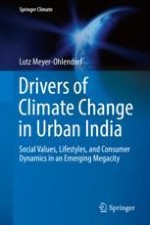2019 | OriginalPaper | Buchkapitel
2. Approaches of Measuring Human Impacts on Climate Change
verfasst von : Lutz Meyer-Ohlendorf
Erschienen in: Drivers of Climate Change in Urban India
Aktivieren Sie unsere intelligente Suche, um passende Fachinhalte oder Patente zu finden.
Wählen Sie Textabschnitte aus um mit Künstlicher Intelligenz passenden Patente zu finden. powered by
Markieren Sie Textabschnitte, um KI-gestützt weitere passende Inhalte zu finden. powered by
